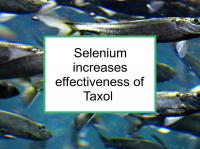Selenium is an essential element with many roles in maintaining health, but high levels are toxic. Adequate levels of selenium protect against cancer development, including breast cancer. Selenium has been shown to increase the effectiveness of both the doxorubicin and the anti-estrogen tamoxifen.
Now a new study has reported that selenium synergistically enhances the growth inhibitory effect of the taxane chemotherapy drug paclitaxel in triple negative breast cancer cells.
Selenium is an essential element, but high levels are harmful
Selenium is a trace element that is essential to health, but is needed only in small amounts. Selenium is required for the proper functioning of the immune system and it also appears to have a role in DNA repair. Selenium counteracts the harmful effects of exposure to heavy metals such as cadmium, mercury, and chromium.
Selenium is incorporated into proteins (selenoproteins) that are important antioxidant enzymes, which help prevent cellular damage from free radicals. Selenoproteins also act as catalyst for the production of thyroid hormone, acting with iodine. Selenium helps regulate and improve glucose metabolism. However, taking selenium supplements does not appear to prevent type 2 diabetes, and in fact might increase risk for the disease.
Both inadequate and high levels of selenium are associated with heightened cancer risk. One large U.S. study reported that the association between selenium levels and cancer mortality was nonlinear; an inverse association at low selenium levels (< 130 ng/mL) and a modest increase in mortality at high selenium levels (> 150 ng/mL) was observed. The average serum selenium level was 125.6 ng/mL. Another study of men in New Zealand, a country with low levels of selenium in its soil, suggested that blood selenium levels lower than 100 ng/ml were inadequate for repair of oxidative and other DNA damage.
Excess selenium intake can cause selenium poisoning, which is characterized by muscle cramps, nausea, vomiting, diarrhea, joint pain, irritability, and fatigue, as well as hair loss and changes to the fingernails and skin. Selenium intake over 400 micrograms (mcg) per day can lead to selenium poisoning. The recommended daily intake of selenium is 55 mcg per day for adults. The typical American diet provides approximately 50 to 150 mcg per day and most U.S. residents have adequate intake.
Selenium increases doxorubicin and tamoxifen effectiveness
Although adequate levels of selenium may be needed to prevent cancer, numerous studies have reported that higher-than-average levels of selenium do not appear to protect against breast cancer. On the other hand, selenium has been shown to increase the effectiveness of both doxorubicin and tamoxifen against estrogen receptor positive (ER+) breast cancer. One study also found that selenium induced apoptosis in tamoxifen-sensitive cells.
Latest research: Selenium increases paclitaxel's action against TN
The study referenced at the beginning of this news article was designed to investigate the impact of methylseleninic acid on the anticancer efficacy of paclitaxel in triple-negative breast cancer. Triple negative breast cancer is a subtype of breast cancer that is estrogen receptor negative (ER-), progesterone receptor negative (PR-), and human epidermal growth factor receptor 2 negative (HER2-). Methylseleninic acid is a commonly used organic selenium compound known to have anti-cancer properties. In the study, mice were first implanted with triple-negative breast cancer cells, which developed into tumors. The mice were then treated for four weeks with the chemotherapy drug paclitaxel (by injection), methylseleninic acid (orally), or both.
The combination of paclitaxel and methylseleninic acid was found to result in a more powerful inhibition of tumor growth than either treatment alone. The reduced tumor growth was accompanied by a reduction in tumor cell proliferation and an induction of apoptosis (programmed cell death). The experiment also demonstrated that the use of methylseleninic acid in the combination regime was safe for mice. The authors conclude that the study findings provide justification for the development of methylseleninic acid and paclitaxel combination therapy for the treatment of triple-negative breast cancer.
Bottom line for breast cancer patients
The message we take from this study and others concerning selenium is that selenium-rich foods are safe to consume during breast cancer treatment. However, patients should avoid overconsuming Brazil nuts - an average of one nut per day would be a reasonable intake. Generally speaking, selenium supplements are neither necessary nor advisable during treatment or afterwards.
Please see our article on breast cancer diet during paclitaxel chemotherapy for more information.
